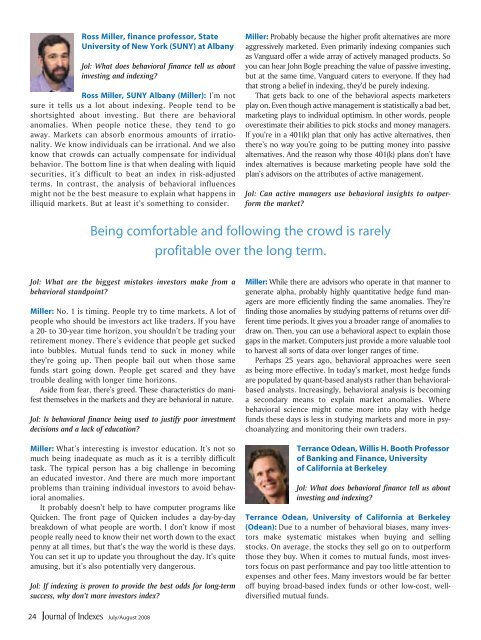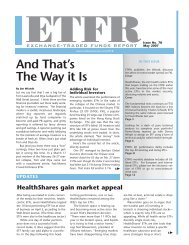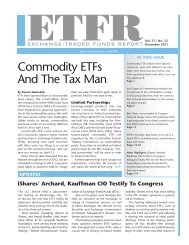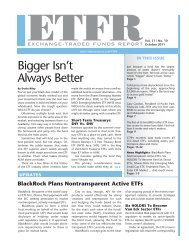Download - IndexUniverse.com
Download - IndexUniverse.com
Download - IndexUniverse.com
Create successful ePaper yourself
Turn your PDF publications into a flip-book with our unique Google optimized e-Paper software.
Ross Miller, finance professor, State<br />
University of New York (SUNY) at Albany<br />
JoI: What does behavioral finance tell us about<br />
investing and indexing?<br />
Ross Miller, SUNY Albany (Miller): I’m not<br />
sure it tells us a lot about indexing. People tend to be<br />
shortsighted about investing. But there are behavioral<br />
anomalies. When people notice these, they tend to go<br />
away. Markets can absorb enormous amounts of irrationality.<br />
We know individuals can be irrational. And we also<br />
know that crowds can actually <strong>com</strong>pensate for individual<br />
behavior. The bottom line is that when dealing with liquid<br />
securities, it’s difficult to beat an index in risk-adjusted<br />
terms. In contrast, the analysis of behavioral influences<br />
might not be the best measure to explain what happens in<br />
illiquid markets. But at least it’s something to consider.<br />
Miller: Probably because the higher profit alternatives are more<br />
aggressively marketed. Even primarily indexing <strong>com</strong>panies such<br />
as Vanguard offer a wide array of actively managed products. So<br />
you can hear John Bogle preaching the value of passive investing,<br />
but at the same time, Vanguard caters to everyone. If they had<br />
that strong a belief in indexing, they’d be purely indexing.<br />
That gets back to one of the behavioral aspects marketers<br />
play on. Even though active management is statistically a bad bet,<br />
marketing plays to individual optimism. In other words, people<br />
overestimate their abilities to pick stocks and money managers.<br />
If you’re in a 401(k) plan that only has active alternatives, then<br />
there’s no way you’re going to be putting money into passive<br />
alternatives. And the reason why those 401(k) plans don’t have<br />
index alternatives is because marketing people have sold the<br />
plan’s advisors on the attributes of active management.<br />
JoI: Can active managers use behavioral insights to outperform<br />
the market?<br />
Being <strong>com</strong>fortable and following the crowd is rarely<br />
profitable over the long term.<br />
JoI: What are the biggest mistakes investors make from a<br />
behavioral standpoint?<br />
Miller: No. 1 is timing. People try to time markets. A lot of<br />
people who should be investors act like traders. If you have<br />
a 20- to 30-year time horizon, you shouldn’t be trading your<br />
retirement money. There’s evidence that people get sucked<br />
into bubbles. Mutual funds tend to suck in money while<br />
they’re going up. Then people bail out when those same<br />
funds start going down. People get scared and they have<br />
trouble dealing with longer time horizons.<br />
Aside from fear, there’s greed. These characteristics do manifest<br />
themselves in the markets and they are behavioral in nature.<br />
JoI: Is behavioral finance being used to justify poor investment<br />
decisions and a lack of education?<br />
Miller: What’s interesting is investor education. It’s not so<br />
much being inadequate as much as it is a terribly difficult<br />
task. The typical person has a big challenge in be<strong>com</strong>ing<br />
an educated investor. And there are much more important<br />
problems than training individual investors to avoid behavioral<br />
anomalies.<br />
It probably doesn’t help to have <strong>com</strong>puter programs like<br />
Quicken. The front page of Quicken includes a day-by-day<br />
breakdown of what people are worth. I don’t know if most<br />
people really need to know their net worth down to the exact<br />
penny at all times, but that’s the way the world is these days.<br />
You can set it up to update you throughout the day. It’s quite<br />
amusing, but it’s also potentially very dangerous.<br />
JoI: If indexing is proven to provide the best odds for long-term<br />
success, why don’t more investors index?<br />
Miller: While there are advisors who operate in that manner to<br />
generate alpha, probably highly quantitative hedge fund managers<br />
are more efficiently finding the same anomalies. They’re<br />
finding those anomalies by studying patterns of returns over different<br />
time periods. It gives you a broader range of anomalies to<br />
draw on. Then, you can use a behavioral aspect to explain those<br />
gaps in the market. Computers just provide a more valuable tool<br />
to harvest all sorts of data over longer ranges of time.<br />
Perhaps 25 years ago, behavioral approaches were seen<br />
as being more effective. In today’s market, most hedge funds<br />
are populated by quant-based analysts rather than behavioralbased<br />
analysts. Increasingly, behavioral analysis is be<strong>com</strong>ing<br />
a secondary means to explain market anomalies. Where<br />
behavioral science might <strong>com</strong>e more into play with hedge<br />
funds these days is less in studying markets and more in psychoanalyzing<br />
and monitoring their own traders.<br />
Terrance Odean, Willis H. Booth Professor<br />
of Banking and Finance, University<br />
of California at Berkeley<br />
JoI: What does behavioral finance tell us about<br />
investing and indexing?<br />
Terrance Odean, University of California at Berkeley<br />
(Odean): Due to a number of behavioral biases, many investors<br />
make systematic mistakes when buying and selling<br />
stocks. On average, the stocks they sell go on to outperform<br />
those they buy. When it <strong>com</strong>es to mutual funds, most investors<br />
focus on past performance and pay too little attention to<br />
expenses and other fees. Many investors would be far better<br />
off buying broad-based index funds or other low-cost, welldiversified<br />
mutual funds.<br />
24<br />
July/August 2008
















